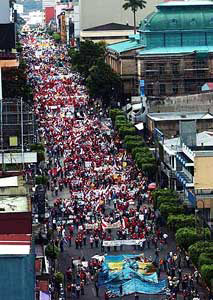 |
 |
 |
 News from Around the Americas | October 2007 News from Around the Americas | October 2007  
Costa Ricans Vote for CAFTA Under Threat
 Heather Cottin - Workers World Heather Cottin - Workers World
go to original


| | Sept. 30 march against the Central American Free Trade Agreement. |
Although hundreds of thousands of Costa Ricans had earlier voted with their feet in a massive march against the Central American Free Trade Agreement, the nation narrowly voted to accept CAFTA on Oct. 7 after U.S. threats and intimidation.

So-called free trade, which really means imperialist-imposed rules that undercut indigenous industries, has spelled destitution to thousands of farmers and small businesses in Central America. Guatemala’s National Peasant and Indigenous Coordinating Organization (CONIC) warned Costa Ricans against the CAFTA accords:

“A year already of CAFTA implementation in Guatemala, and the experience has been disastrous . . . imports increased the price of corn, [our] sacred and basic food.” CONIC leaders noted that in Mexico, after NAFTA was passed, thousands of farmers had to move to the cities because they could not compete with U.S. companies’ low prices for corn. (Prensa Latina, Oct. 5) Once these farmers have been dispossessed, the price then goes up.

A farmer in El Salvador from Cacaopera in Morazan province recently told Workers World: “Since CAFTA, our unemployment is over 60 percent. Privatization of basic things like water and electricity and health care has made life for the poor even worse. Our young people are leaving the countryside, never to return.”

The depopulation of the rural areas in Mexico, Guatemala, El Salvador, Nicaragua and Honduras has fueled increased emigration to the U.S. It is not sanctioned by law, as is the migration of capital to the region from imperialist countries. But it is necessary for the survival of rural and urban populations. The remittances they send back to families are keeping millions of people alive in the face of increasing poverty and privation accelerated by the “free trade” rules.

As family farms and even large plantations, or fincas, have declined throughout the region, peasants have fled to the cities seeking work. Jobs are available in the transnational factories called maquilas, but they can pay as little as $6 a week and CAFTA and NAFTA regulations do not protect the right of unions to organize, so private guards and police brutally enforce anti-labor practices.

The ruling class elements in Costa Rica support free trade. In Mexico and the rest of Central America, the upper and middle classes, a small but powerful group, stand to benefit from CAFTA. Since they control the media in Costa Rica, they promoted CAFTA, claiming that U.S. companies have brought jobs and gobs of money to Central America since the passing of their free trade agreements.

Central Americans and Mexicans facing joblessness and agricultural depression have been forced to migrate to support their families. When they come to the U.S. they face raids, deportation and racism perpetrated by Washington and the anti-immigrant corporate media. So the same U.S. government that pressured for CAFTA and NAFTA treats Mexican and Central American immigrants as criminals and scapegoats for the declining economy in the U.S.

U.S. companies have pushed free trade agreements that enable them to close their U.S. factories and lay off workers. Paying workers low wages in Third World countries has profited U.S. manufacturers. The poor pay the price—both in Latin America and the U.S.

But Washington and Costa Rica’s government are not concerned with the poor, except to use them. The White House told Costa Ricans that if they did not vote for CAFTA, it would not extend trade preferences now afforded to Costa Rican products. (Associated Press, Oct. 7) The major newspaper in Costa Rica published on its front page a letter by U.S. Trade Representative Susan Schwab warning that the U.S. would refuse to renegotiate the terms of the free trade agreement with Costa Rica if CAFTA was voted down.

In other words, the Bush administration threatened the Costa Rican economy with economic strangulation. According to Eugenio Trejos, rector of Costa Rica’s Technological School, competition among transnational companies jeopardizes public ownership of electricity, telephone and water services.

When the vote finally came, it was close, with only 51 percent in favor of CAFTA. Costa Ricans will now face a frenzy of privatization and commodification of their economy.

Costa Rica boasts of being the most prosperous country in Central America. What lies in store for it is what has happened to Mexico and Central America: greater disparities between rich and poor, more agricultural dependency, higher prices for staples, and soon more people in the streets demanding an end to imperialist free trade agreements. | 
 | |
 |



